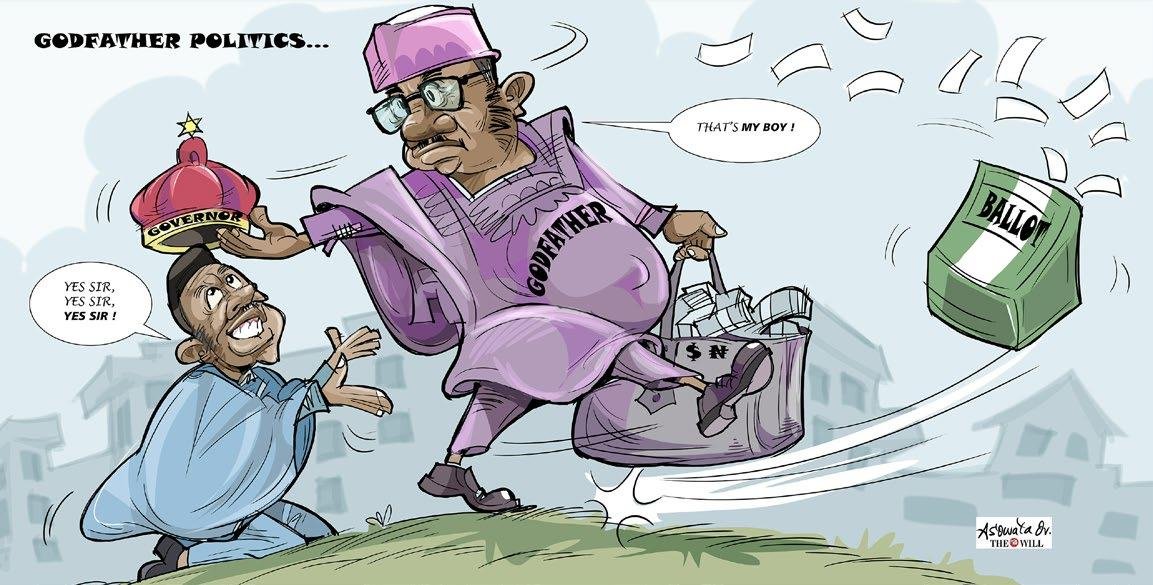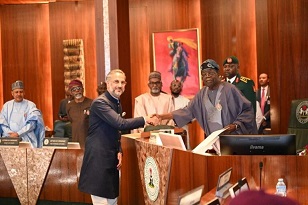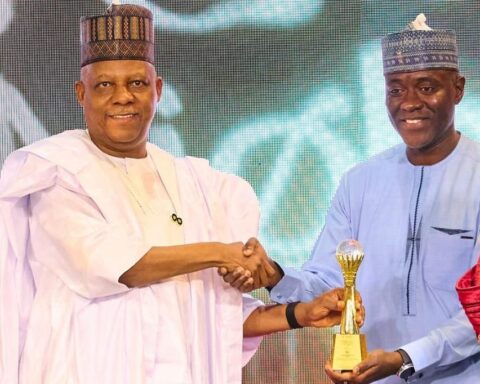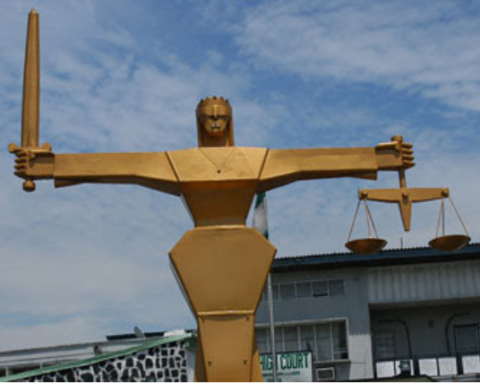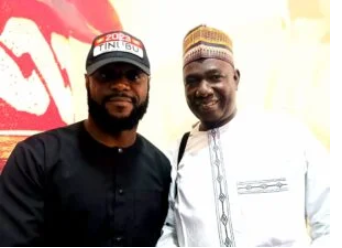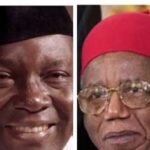By Abdul Oroh
THE spectacle was a familiar one to me. And the humiliating experience has just been revived. How can one forget the day Chief Anthony Anenih, perhaps the most prominent godfather, since the dawn of the Fourth Republic, summoned National Assembly leaders from the South South geo-political zone to his leafy Jose Marti Street home, Asokoro in Abuja? President Olusegun Obasanjo had decided to impose a state of emergency in Plateau State and sacked the State Governor, Joshua Dariye.
We were not aware of this plot and Chief Anenih, Obasanjo’s street smart Mr fix- it, was directed to fix it. As we filed into his house that morning at 8 am, we met Anenih at breakfast with his prominent godson, the late Dr Cairo Ojougbo, who was also my friend and fellow member of the House of Representatives, also at breakfast. As we came in like school children summoned by the headmaster to face punishment, Anenih did not as much as looked us in the face and there were no complimentary greetings typical of civilized meetings, especially in an African setting.
He didn’t welcome us to his house nor thanked us for honouring his invitation. Neither did he invite us to join him for breakfast. The expression on his face was grave, like the ancient Benin mask. He eyed his gold wristwatch, apparently to be sure he wore it or to confirm if we came late to the meeting. As we stood watching like prisoners and wondering why we had been summoned so early that morning, it was clear something important had happened and then Anenih broke the ice.
“Distinguished Senators and Honourables, the President will declare a state of emergency in Plateau State anytime from now. Go and approve it; good morning’’. The meeting was over and he did not as much as cared to look at our faces. No member uttered a word.
From top-notch professionals, businessmen, retired senior military officers, petroleum engineers, architects, senior advocates of Nigeria and others like me, we filed out of his house, meekly, coldly belittled and as dumb as a herd of sheep.
As we filed into our luxury cars, bought for us by the tax payers, heading to the National Assembly, it occurred to me that the man who directed us to violate the constitution, was not elected and didn’t have the mandate of the people to so act. But he was the godfather, more like the paramount ruler of the South –South.
The governors deferred to him and even fellow minsters treated him with awe. As I joined Hon Austin Opara, the then Deputy Speaker in his car, I could not hide my disdain. I told him how insulted I felt and that I would not vote for the emergency rule in Plateau. Opara appeared stressed and unhappy and didn’t try to persuade me to toe the party line. Godfathers after all can be defied and if fought, can be defeated.
That was Anenih’s ultimate fate in Edo State. But that was not the end of godfatherism in Edo State or in the country.
The State of emergency declared in Rivers State by President Bola Ahmed Tinubu and subsequently approved by the National Assembly has again highlighted the perilous intrusion of godfatherism in our body politic.
The video that has been trending since the spat between the governor of Rivers State, Siminalayi Fubara and his predecessor and godfather, Ezenwo Nyesom Wike became public, is so surreal, like something made for the soap opera, but which tragically, is real. Wike, in the video, was like a preacher or a sage, or if you like, the area boy who has seen it all and had learned the lessons of street fighting as a bus conductor in Ibadan. In his case, it was the experience from the murky waters of Nigerian politics that Wike has to show for it. A godfather admonishing the young godson.
With combat wounds to show for it, the preacher had triumphed in his combats in Ekiti State, famous more for producing eminent professors and academics than for political gladiators. Against formidable opponents with glittering academic achievements, a seeming bus conductor, won the governorship of the state, lost it through impeachment orchestrated by the strong arm of the man who wanted to be the father of modern Nigeria.
The so called conductor regained power by defeating an incumbent schooled in modern warfare and in the prodemocracy struggle. His weapon of choice, was simple: “stomach infrastructure’’. That phrase has entered our political lexicon on how to entice the electorate to a point of dependency and personal loyalty, not because of roads constructed, hospitals or schools built.
But those who knew him claimed he also deployed lethal weapons with brutal efficiency. He was feared even by traditional rulers. As his political enemies scamper for their dear lives by relocating to Abuja or Lagos, or joining him as they could not beat him.
As he stood there in the Banquet Hall of the Government House, Port Harcourt, having just been flown in on a Rivers State government-owned jet, he was in his full element. And like a comedian schooling and cajoling the young godson, like a child heading to school on his first day, he admonished Fubara: ‘’Don’t see too much o’’, he said in Yoruba accented English. As if mimicking Garuba of the Village Headmaster fame.’
’I didn’t have a godfather, and I wish I had. They showed me pepper. Don’t fight Wike o’, he warned sternly. And then the clincher,’ if you fight Wike, you no go win o’’.
Amid guffaws and a satisfied smile on the robust face of the godfather sitting next to his godson, the preacher, prayed for the godson and wished him God’s grace and wisdom in his journey as the next Governor of Rivers State. With a parting shot, he told his audience:’ if you can’t beat them, join them o”.
To followers of Nigerian politics, it is not so difficult to identify the preacher here. It is Peter Ayodele Fayose, former governor of Ekiti State, known more in the state by his sobriquet as Peter the Rock. If Peter is a product of the Ekiti rocky landscape, the dramatis personae in this tragi-comic strip are of the oil rich riverine stock of the Niger Delta, which since the pre-colonial days, when it was part of the Slave Coast Territory, to the present day when it can more accurately described as the bastion of godfatherism.
Niger Delta has suddenly become synonymous with state repression and resistance, massacres of peasants, destruction of the environment, militancy, corruption and impunity, which have been the lot of the people. Like a fit of convulsion, the people watch in agony as cruel leaders in regime after regime, like a cancerous tumor metastasized, eating away the common patrimony, without empathy, without fulfilling their promises to transform their states and communities. Leaders instead wallow in the pitiable allure of authoritarianism.
Like I noted in this column last week, Port Harcourt, the so-called garden city and the unofficial capital of the Niger Delta, ought to compare with Houston in Texas, or Cape Town, South Africa or Dubai. But now, military trucks are rolling on the streets of Port Harcourt as godfather and godson fight without giving a hoot about what or how the people feel.
That is the state of governance in many state houses across the country today as democracy has been turned into a parody and governance, a criminal enterprise.
Senator Seriake Dickson, former governor of Bayelsa State gave another spin to the godfather narrative when he confessed that he had ‘’facilitated’’ the emergence of a successor in Yenagoa and this trend has become the norm in Nigeria. Most times, the outcome does not meet the expectation of the godfather, who in most cases, had expected the godson- governor to cover his malfeasance and save him from the EFCC. The godfather is often ignored, unappreciated, scorned and vilified.
Dickson, like many senators, sought refuge in the senate and had the good sense to move on, and not look back. Not Wike, a pugnacious street fighter and nemesis of PDP mandarins, who view politics as a business and national leadership as a divine right.
As the Minister of the Federal Capital Territory, a powerful position which is equivalent to governor of a State, if not more prestigious, Wike has rightly been savaged for not giving Fubara the space to operate, while the godson is equally and rightly too, criticized for picking a fight with his “chi” when he had hardly learned to walk.
Fubara has been accused of not respecting the President’s mediation effort and resorting to brigandage, destroying the State House of Assembly, just as former governor, Godwin Obaseki did in Benin-city Edo State.
The more tragic part is that the crises afflicting some of these states, which sometimes manifest as squabbles between godfather and godson are symptomatic of the general political malaise in this country. Having been part of the system, I must confess that this malaise goes beyond the declaration of emergencies in troubled states as we have witnessed since 1999.
The main problem is our failure to sincerely fight corruption, manage diversity; failure to enforce the rule of law, weak institutions of accountability and law enforcement, reluctance and utter failure to admit that the leadership selection process in Nigeria has failed with the so-called leaders using any means necessary to capture power, not to serve but to plunder, to capture the state for keep.
That is the reason we have not been able to conduct free and fair elections, to restore the power of the people to choose their leaders, and remove them if they failed to keep their promises or meet our expectations.
Even if we restructure the country, either by returning to the 1963 model, or any other system, the leaders would have to emerge through elections and if we don’t deal with the process of leadership selection and other contradictions in the political economy of the nation, then we would continue to drift and stagnate until, God forbid, the nation ceases to exist.
The symptoms of state failure are there for us all to see. We can see it in the internal violent conflicts all over the country; the systematic failure of critical national institutions like the judiciary, which should be the last resort in peaceful resolution of conflicts, the near impotence of the National Assembly, to truly and effectively assert its independence. Incredible reports everyday by the EFCC and ICPC of billions being stolen, with the accused persons, instead of being sent to and kept in jail till justice is done, are allowed to walk freely, and savouring the limelight as if it is a badge of honour.
When President Obasanjo resorted to declaring a state of emergency during his turbulent rule, the expectation was that it would curb the violent and criminal impulses of some state governors, even if Obasanjo himself was not better than those state governors he forced out. His actions failed to cure the mischief. Even if we cannot solve all our socio-economic problems in the next few years, President Bola Ahmed Tinubu, the leader of the APC, on whose desk the buck stops, should give the Nigerian People, the environment conducive for a free and fair election in 2027.
Tinubu is sure to win in 2027. If he does not, it would not be a tragedy. The time to tame the specter of the clay footed monster called the godfather is now. Godfathers are a danger to national security, social cohesion, political stability and democratic consolidation.
